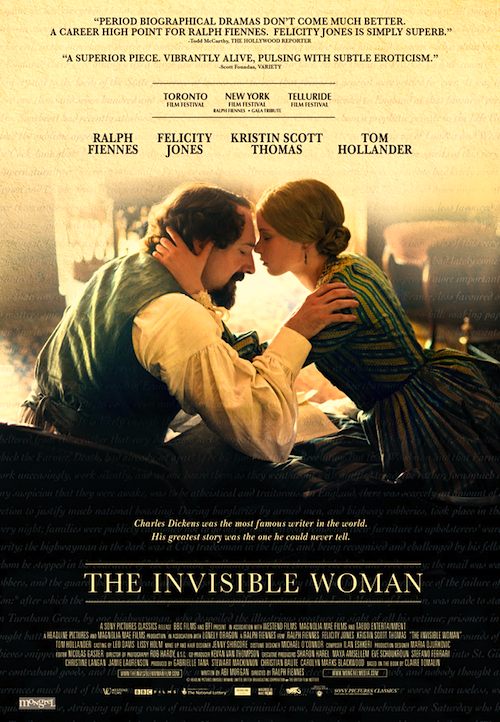By Joe Bendel. Her actress-sister Frances eventually became Anthony Trollope’s sister-in-law. For her part, Ellen Ternan had a much closer relationship with Charles Dickens, but she was infamously not his wife. Ralph Fiennes brings their not-so-secret affair to the screen as the director and star of The Invisible Woman, which opened yesterday in New York.
Dickens was a genuine literary celebrity—the Stephen King of his era. He even wrote serialized novels, too. Dickens also had ten children from his plain, unassuming wife, Catherine. As the Dickenses grow increasingly distant, it is not terribly surprising the novelist will eventually succumb to temptation with one of his many admirers. That will be Ellen “Nelly” Ternan.
By all accounts, Ternan was a middling actress at best, but she still caught Dickens’ eye in a production of The Frozen Deep, his quasi-collaboration with Wilkie Collins. Dickens quickly becomes a patron to the Ternan family, including her mother and two sisters, all of whom are considered better thespians than Ellen. Of course, Mrs. Ternan is no fool, but she understands the limits of her daughter’s options.
 Nevertheless, this is still Victorian England, when scandal meant something. To play the part of Dickens’ mistress, Ternan will have to assume the titular invisibility. Even if she wanted to, she is incapable of flaunting social norms, like Collins and his lover. Regardless, the truth is bound to come out sooner or later, or else Fiennes’ film would never exist.
Nevertheless, this is still Victorian England, when scandal meant something. To play the part of Dickens’ mistress, Ternan will have to assume the titular invisibility. Even if she wanted to, she is incapable of flaunting social norms, like Collins and his lover. Regardless, the truth is bound to come out sooner or later, or else Fiennes’ film would never exist.
So here it is, somewhat more preoccupied with societal conventions and class distinctions than a typical installment of PBS’s Masterpiece, but not too very far removed stylistically. It is hardly an apology for Dickens, but Fiennes’ lead performance is easily the best thing going for it. He rather brilliantly expresses the passion and recklessness lurking beneath his almost painful reserve. Unfortunately, it is sort of like watching one hand clap during his scenes with Felicity Jones’ Ternan. When Fiennes is quietly intense, she is just quiet.
Frankly, Invisible must stack the deck against Dickens’ poor, anti-trophy wife to sell his attraction to the pale, mousy Ternan. Maybe we just don’t get Jones here, but it seems like most red blooded scribblers would be more interested in Kristin Scott Thomas’s elegant and sultry Mrs. Ternan. Regardless, Joanna Scanlon’s performance subverts the intended sabotage of her character, investing the real Mrs. Dickens with excruciating dignity and humility.
Certainly presentable by general British costume drama standards, The Invisible Woman is more distinguished by Fiennes’ turn as an actor than a director. There is also plenty of fine work from Thomas, Scanlon, and Tom Hollander as Collins, but the central chemistry is lacking. Recommended mostly just for voracious Victorian readers, it opened Christmas Day in New York at the Angelika Film Center.
LFM GRADE: C+
Posted on December 26th, 2013 at 2:02pm.
